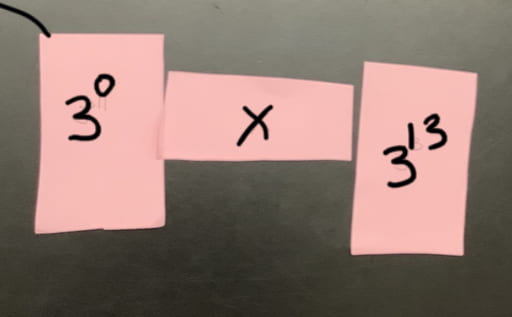Game of exponent laws
This project was called Game of Exponent Laws. For this project we were put in partners and we had to make a game using four or more exponent laws. We started the project by learning the basic exponent laws and then they got more complicated as we went on. Once we started brainstorming game ideas, we decided to base our game off of the card game War.
Our game is called the No Name Exponents Game and is for two players. There is a single operations card in the middle and then each player flips up a card that has an exponent on it (like 3^5) and then you have to solve it using that operation. Whoever does it first wins that round, and whoever gets to 3 points gets to change the operations card. You play until the deck runs out and whoever has the most cards wins the game.
Game⬇️

Reasoning and Analyzing: Use logic and patterns to solve puzzles and play games
I showed this competency by creating a game that is simple, includes math and is still fun to play. I created this game with a clear points system. Every time you win a round you get a coin, and the first person with three coins gets to change the operation. The game ends when each player’s deck runs out and the player with the most coins wins.
People playing our game⬇️
Communicating and Representing: Represent mathematical ideas in concrete, pictorial, and symbolic forms
My game shows this curricular competency by using some of the mathematical exponent operations that we have learned: multiplication, division, distribution law, and the zero exponent law. Another way I showed this curricular competency is in my game rules. In my rules I included images and clear instructions of how to set up the game and how to play.
Rules⬇️
Applying and Innovating: Contribute to care for self, others, community, and world through individual or collaborative approaches.
My partner and I made the game together and evenly distributed the extra workload. I used my class time efficiently making the game so that there was minimal homework.
Our game⬇️
Driving Question
How does math make games more complex, interesting, and re-playable?
The way math makes games replayable is because the outcome always varies. Our game doesn’t always have the same outcome because you shuffle the pile so that the exponent cards you flip are always different, which makes the game more interesting.
Protect start mind map⬇️

Thanks Dana for being a great partner and Fraser, Ava and Sabrina for helping with the photos.


